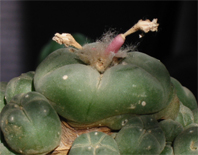As mentioned in the Blossfeldia liliputana post Sebastián Santecchia from Salta, Argentina has been kind enough to let me post some of his wonderful habitat pictures. The following Yavia cryptocarpa photos are all courtesy of Sebastián.
Yavia cryptocarpa mimicking its environment
The genus and species Yavia cryptocarpa was described from Argentina by Kiesling and Piltz in 2001. Yavia is only known from a small area just on the Argentinian side of the border with Bolivia, in the province of Jujuy, near La Quiaca, at 3,700m. Although the species probably has a wider distribution, its small size plus the strongly camouflaged aspect make it difficult to know its distribution with any degree of confidence.
Hydrated Yavia cryptocarpa
As is evident from the above photo, a fully hydrated Yavia is very exposed to the sun. As the plant dehydrates the small spines “lock up” to form an armor that helps protect the plant from the sun.
The genus is named after the Department of Yavi, Argentina and the specific name cryptocarpa refers to the plant being a cryptocarp, i.e. bearing fruits that are retained concealed inside the stem of the plant, only becoming visible when the plant shrinks in the drought period. 
Yavia cryptocarpa with two fruits
You can find more of Sebastián's Yavia photos here and view all his pictures of cactuses in habitat (Bolivia and northern Argentina) at the SagtaCactus flickr photostream.
References
Roberto Kiesling & Jörg Piltz, Yavia cryptocarpa R. Kiesling & Piltz, gen. & sp. nov. Kakteen und andere Sukkulenten 52 (3): 57-63, 2001.
Roberto Kiesling & O Ferrari, Yavia cryptocarpa – conservation action on a new and interesting cactus. British Cactus and Succulent Journal 21 (1): 20–25, 2003
Mitteilungen der Deutschen dendrologischen gesellschaft. 1924 (added:
01/12/2026)
-
*By:*
Deutsche Dendrologische Gesellschaft
*Publication Info:*
Wendisch-Wilmersdorf; [etc.] Thyrow (Kr. Teltow), [etc.]
*Call Number:*
QK1 .D49
*Contributing...
4 weeks ago



















Yavia cryptocarpa .... just the most beautiful of cacti ! Great pics ! I dont have this in my collection it looks best in it's natural habitat anyway . Very humid in Cornwall here ,so I am growing more and more Epiphyllums these days . I do have one very small and slow growing Lophophora though ,which I hope one day will flower for me .Debs
ReplyDelete